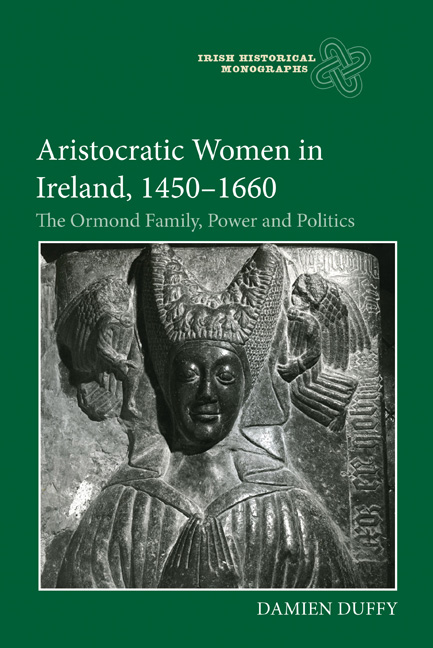Book contents
- Frontmatter
- Dedication
- Contents
- Preface
- Acknowledgements
- List of Abbreviations
- Introduction
- 1 Aristocratic Women’s Lives in Late Medieval and Early Modern Western Europe
- 2 The Ormond Women Through the Wars of the Roses and Immediate Aftermath: Marriage, Absenteeism and Illegitimacy
- 3 New Beginnings: The Heiresses, the Usurper and Royal Intervention – the Succession of Margaret and Anne Butler
- 4 Dynastic Consolidation and Female Political Entity: Margaret Fitzgerald, Countess of Ormond and Ossory (1472–1542)
- 5 Family, Marriage and Politics: The six Daughters of Margaret Fitzgerald and Piers Butler and the Ongoing Revival of the Earldom in the Sixteenth Century
- 6 ‘You have too Piteous a Face to be a Warrior’: Joan Fitzgerald, Countess of Ormond, Ossory and Desmond – Agent, Peace Broker, Advocate
- 7 Black Tom’s Women: Unions, Succession and Decline
- Conclusion
- Bibliography
- Index
- Irish Historical Monographs Previous Volumes
3 - New Beginnings: The Heiresses, the Usurper and Royal Intervention – the Succession of Margaret and Anne Butler
Published online by Cambridge University Press: 26 March 2021
- Frontmatter
- Dedication
- Contents
- Preface
- Acknowledgements
- List of Abbreviations
- Introduction
- 1 Aristocratic Women’s Lives in Late Medieval and Early Modern Western Europe
- 2 The Ormond Women Through the Wars of the Roses and Immediate Aftermath: Marriage, Absenteeism and Illegitimacy
- 3 New Beginnings: The Heiresses, the Usurper and Royal Intervention – the Succession of Margaret and Anne Butler
- 4 Dynastic Consolidation and Female Political Entity: Margaret Fitzgerald, Countess of Ormond and Ossory (1472–1542)
- 5 Family, Marriage and Politics: The six Daughters of Margaret Fitzgerald and Piers Butler and the Ongoing Revival of the Earldom in the Sixteenth Century
- 6 ‘You have too Piteous a Face to be a Warrior’: Joan Fitzgerald, Countess of Ormond, Ossory and Desmond – Agent, Peace Broker, Advocate
- 7 Black Tom’s Women: Unions, Succession and Decline
- Conclusion
- Bibliography
- Index
- Irish Historical Monographs Previous Volumes
Summary
‘I understand to my great heaviness that my Lord, my father is departed this world to the great God on whose soul I beseech Jesus to have mercy.’ Thus wrote Margaret Butler to her son, Thomas Boleyn, upon hearing of the death of her father, Thomas Butler, seventh earl of Ormond, who died aged about 90 in August 1515. In his will dated 31 July 1515, the old earl directed that his property, including holdings he had acquired through the Hankeford inheritance upon his marriage in 1445, was to be divided equally between his two surviving offspring, Anne and Margaret. This unprecedented circumstance precipitated a crisis in which the heiresses’ claim to their inheritance was challenged by rival claimants based in the Irish earldom, chief among them Piers Butler. So how did that crisis – which began in 1515 and only ended in 1538 when Piers Butler was elevated to the earldom of Ormond – unfold, and what were the challenges faced by Margaret and Anne as co-heiresses in the context of succession in contemporary English and Irish families? The Butler sisters’ case was neither unique nor unprecedented since the obstacles they faced, including rival claims from other family members, were commonplace, particularly in cases of potential female inheritance.
Jennifer Ward noted how in late medieval Europe, ‘the developing legal frameworks governing tenure and inheritance had a major impact on the position of women’. Broadly speaking, the practices of entail and primogeniture became increasingly similar in the twelfth century,although the laws regarding inheritance varied considerably between regions across Western Europe. In contrast with areas including Burgundy and Limousin where, if the dowry comprised a daughter's share of the inheritance, she was required to return her dowry in order to receive any part of the family lands, in Ireland, as in England, Scotland, France and Holland, women were better off, being entitled to hold land whether as widows or heiresses.
In a context in which succession arrangements favoured sons and wider related males, when no such heirs were available, succession disputes frequently arose between legitimate female heiresses and wider male kin.
- Type
- Chapter
- Information
- Aristocratic Women in Ireland, 1450-1660The Ormond Family, Power and Politics, pp. 53 - 75Publisher: Boydell & BrewerPrint publication year: 2021



